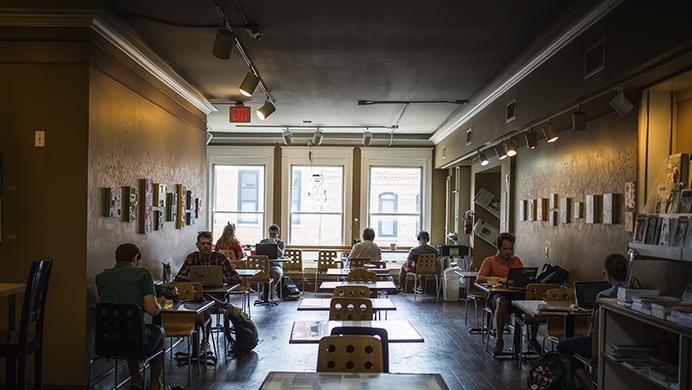By Joshua Balicki
[email protected]
In her début story collection, Sour Heart, Jenny Zhang creates a harrowing, heartbreaking, and intimate depiction of Chinese immigrant America.
Through seven separate, yet interwoven, short stories, Zhang takes us from a public school in Queens to the Chinese Revolution, from a cockroach-infested apartment in Bushwick to the chaotic streets of Shanghai. While the collection covers a wide range of topics and locations, Sour Heart originates from one earnest place. Zhang will read from thecollection at Prairie Lights, 15 S. Dubuque St., at 7 p.m. today.
At a young age, as early as elementary school, she loved to write. There was a lot of hearsay, drunken stories, and blurred memories that came out of her house during family parties. These stories helped influence her storytelling in Sour Heart.
“When you are a kid you can easily blend into the wallpaper,” Zhang said. “You are sitting there when the adults are talking about the past or China … I have so many memories of parties with family friends that found themselves stranded in America … I drew from a lot of those stories as inspiration.”
Interested in archetypes, she explores how communities endure traumatizing experiences. She notes that there is a kind of sameness to it all. “I wanted to explore the ways in which you immigrate to America in 1991, with $30 in your pocket, with a face that can be identified as Chinese,” Zhang said. “It is a group portrait of a specific community of people. Highly educated Chinese-Americans from Shanghai immigrate to New York City in 1991 to pursue higher education.”
Sour Heart is a coming-of-age story about young girls caught between two conflicting worlds of adulthood and adolescence. They are poor and struggling to find their place in America.
“Youth and femininity combined are the most fetishized in our media culture,” Zhang said. “We are obsessed with the appeal of them, dissecting them, putting them on the pedestal, dragging them off the pedestal, and I wanted to see if I could create a space where it was neither about idealizing nor denigrating young women.”
Her passion for both youth culture and femininity translates into her collection. The power and powerlessness in these vulnerable years often hold intense consequences. Zhang refuses to fit into a certain mold.
“Sometimes, we want women writers to confine themselves and to be numb, and to be detached, and to be neat and prim … I wanted to write in this style, which I never thought it would be considered fresh or against the grain … Little by little I realized that I was writing something nobody expected from me.”
Zhang attended the Iowa Writers’ Workshop in 2007 right after her undergraduate work at Stanford.
“Iowa is a prestigious institution, and you are surrounded by an impressive history and legacy,” Zhang said. “It really helped me think of myself as a writer.”
Maximalist writers have had the most influence on her work. She their style is somewhere between “A rant and a stream of consciousness,” which is something she tries to emulate in her own writing.
Zhang also references Philip Roth, David Foster Wallace, and James Joyce as some of her early literary influences. For her, there is a pressure in the fiction market to write novels, only novels.
“The arc of professionalization wants a writer to become a novelist,” she said. However, given her unique style and narrative voice, she said, it was appropriate to write a collection of short stories.
“I wanted to get away from the grandmaster narrative associated with the novel,” she said.
Poets at the University of Iowa also inspired Zhang to delve into the realms of poetry. This worked as a reprieve from studying and writing fiction.
“[Poetry] was an education outside of my education,” she said. “Writing poetry was like playing hooky from school. Poetry did not feel like work. It was fun. That was what I was missing. I felt like an idiot when reading and writing it [poetry], which is a pretty cool intellectual place to be.”
Lena Dunham read her poetry collection, Dear Jenny, We Are All Find, and asked Zhang to open for her Not That Kind of Girl book tour in Iowa City. Later, Dunham launched an imprint called Lenny. This division of Random House prides itself on taking chances on unique voices in literature.
“[Dunham] was the first person who was like, ‘I do not care if it is a short story or novel or a hybrid collection of essays, I just love your voice,”’ Zhang said.
She sold the collection to Lenny. This turned out to be vital for her success as a writer.
Whether Sour Heart is called, “Ingenious,” by The New Yorker, “Brilliant,” by the “Today Show,” or “Fierce” by NPR, Sour Heart has received unrivaled praise. Through it all, Zhang has handled her literary success quite modestly.
“The most important thing for me now is to try to shut it all out and go back into that private place where writing is possible,” she said. “At some point my work and me as a person becomes symbolic. I have to accept that these stories have a life of their own.”
Jenny Zhang
When: 7 p.m. today
Where: Prairie Lights, 15 S. Dubuque
Admission: Free



